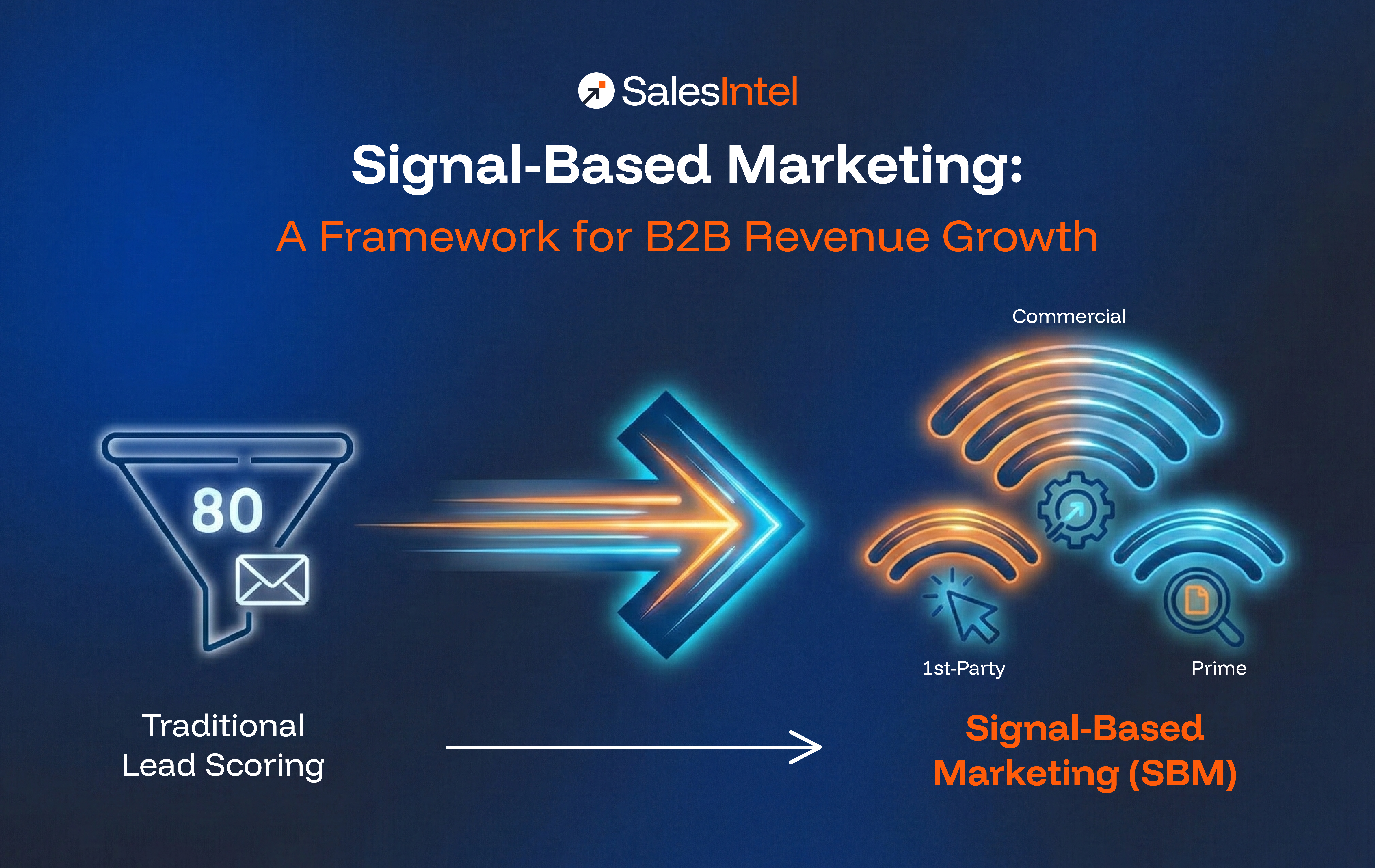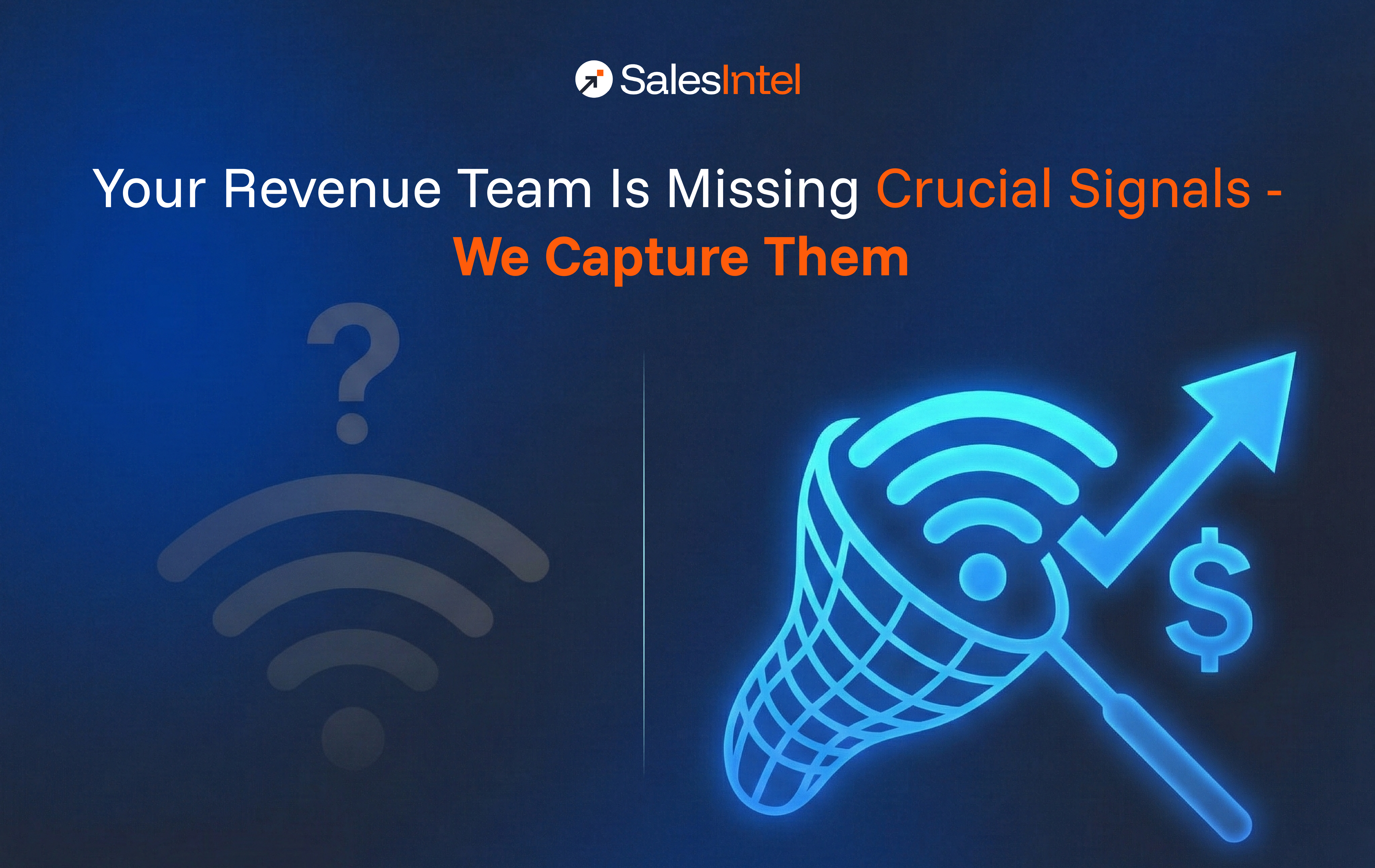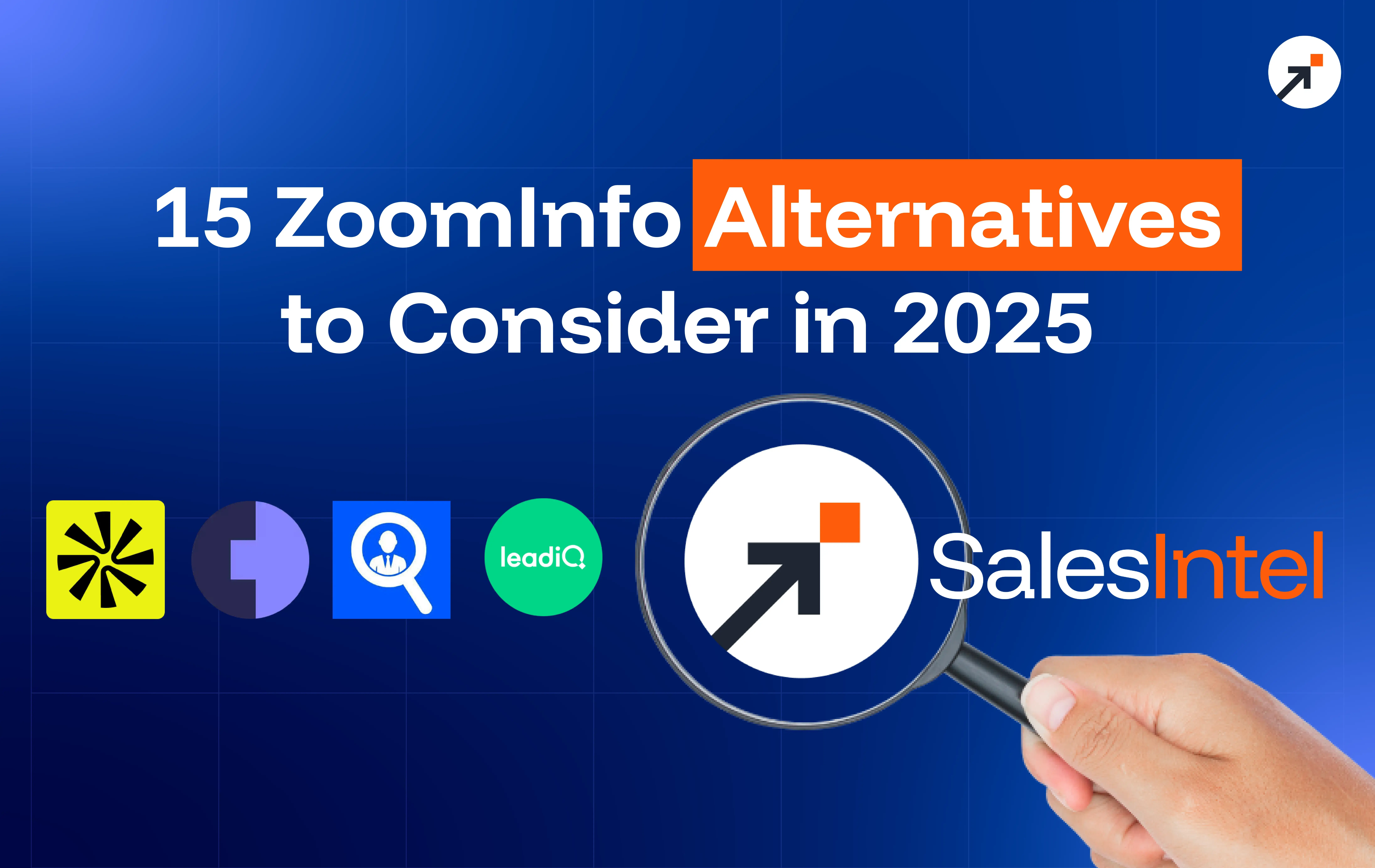In the fast-paced B2B sales, relying on intuition and outdated spreadsheets is like trying to navigate a bustling city with a paper map from the 90s. You might get somewhere, eventually, but you’ll miss a ton of opportunities and probably get stuck in traffic (or, in sales terms, endless cold calls to uninterested prospects). Today, the real secret weapon for closing more deals isn’t just about working harder; it’s about working smarter, armed with data.
And that, my friends, is where Sales Intelligence steps onto the stage, ready to transform your entire sales operation.
Did you know that companies that leverage sales intelligence tools are 4.1 times more likely to identify new opportunities across accounts? This isn’t just a hunch; it’s a proven fact that utilizing the right data can dramatically boost your sales team’s effectiveness and, ultimately, your bottom line. In a market projected to reach $3.99 billion by 2025, with a rapid CAGR of 10.3%, sales intelligence isn’t just a trend it’s the future of how winning teams find, engage, and close deals.
So, what exactly is this mystical “Sales Intelligence” we keep hearing about? Let’s peel back the layers.
What is Sales Intelligence? The Definitive Breakdown
At its core, Sales Intelligence is the collection, analysis, and application of data and insights to make informed, strategic decisions throughout the entire sales process. Think of it as your sales team’s personal Sherlock Holmes, constantly piecing together clues about prospects, customers, and market trends to give you an unparalleled competitive edge.
It moves beyond basic contact lists or CRM data by enriching and leveraging a vast array of information. This isn’t just about who to call, but why, when, and what to say to truly resonate. It transforms raw data into actionable insights, helping sales professionals:
- Understand Prospect Needs: Dive deep into a prospect’s business challenges, goals, and pain points before the first interaction.
- Identify High-Value Opportunities: Pinpoint the companies most likely to buy your solution, saving precious time and resources.
- Personalize Outreach: Craft messages that speak directly to the individual, making them feel seen and understood, not just another number on a list.
- Optimize Sales Strategies: Continuously refine your approach based on real-time market trends and buyer behavior.
- Shorten Sales Cycles: Get to the point faster by engaging decision-makers who are genuinely interested.
In essence, Sales Intelligence prepares sellers with the data and insights they need to confidently approach every interaction, making their pitch a solution, not just a product description.
Why Sales Intelligence Isn’t Just “Nice to Have” – It’s Essential
In today’s ultra-competitive landscape, buyers are more informed than ever. They expect vendors to understand their unique goals and challenges. In fact, Salesforce’s State of Sales Report found that 86% of business buyers are more inclined to buy when vendors demonstrate an understanding of their goals.
Sales intelligence empowers your team to meet this expectation head-on. It’s the difference between a generic “spray and pray” approach and a targeted, personalized strategy that converts. Without it, you’re essentially flying blind in a data-rich sky.
Here’s why sales intelligence has become non-negotiable for any revenue team aiming for consistent growth:
- Enhanced Prospecting: No more guessing games. Sales intelligence tools help you build Ideal Customer Profiles (ICPs) and find companies that fit the bill, along with the right people to talk to within them.
- Improved Personalization: Generic emails and cold calls? Those are so last decade. Sales intelligence provides the context needed to tailor your message, making it relevant and engaging.
- Superior Lead Qualification: Focus your efforts on leads that are genuinely interested and ready to buy. This means less wasted time and higher conversion rates.
- Accurate Forecasting: With deeper insights into your pipeline and buyer behavior, you can make more reliable revenue projections and allocate resources smarter.
- Competitive Edge: Keep tabs on what your competitors are doing, what technologies your prospects are using, and where market opportunities lie.
- Boosted Productivity: Automate tedious data gathering and enrichment tasks, freeing up your sales reps to do what they do best: sell.
The Anatomy of Powerful Sales Intelligence: What Data Points Matter?
Sales intelligence isn’t a monolithic block; it’s a rich tapestry woven from various types of data. A robust sales intelligence platform should provide a comprehensive view, encompassing:
- Firmographic Data: This is the bedrock of understanding a company. It includes:
-
- Company Name & Industry
- Size (employee count, revenue)
- Location (HQ, branches)
- Legal status, ownership, funding rounds
- Growth signals (recent hiring, expansions)
- SalesIntel Perspective: Our firmographic data is meticulously collected and updated, giving you the clearest picture of a company’s structure and potential. We don’t just tell you how big a company is, we help you understand its growth trajectory and stability.
2. Technographic Data: What technologies are companies using? This insight is pure gold.
-
- CRM systems, marketing automation platforms, e-commerce platforms, ERPs.
- Knowing a prospect’s tech stack helps you understand their challenges, identify integration opportunities, or spot potential pain points if they’re using a competitor’s product.
- SalesIntel Perspective: Our technographic data is incredibly granular, allowing you to filter for companies using specific tools. Imagine targeting every company not using your competitor’s software!
3. Contact Data: The golden ticket to actually having a conversation. This goes beyond just an email address.
-
- Full Name, Job Title, Seniority, Department
- Direct Dial Phone Numbers: Absolutely critical for cutting through the noise.
- Verified Mobile Numbers: The holy grail for connecting with decision-makers on the go.
- Work Email Addresses (verified for deliverability)
- LinkedIn Profile URLs
- SalesIntel Perspective: This is where SalesIntel truly shines. We pride ourselves on human-verified contact data, ensuring industry-leading accuracy. Our research-on-demand service means if we don’t have it, we’ll get it for you – typically in under 48 hours. No more bouncing emails or dead-end phone numbers!
4. Intent Data: The ultimate signal of buying readiness. What companies are actively looking for solutions like yours?
-
- First-Party Intent: Your website visits, content downloads, product page views.
- Third-Party Intent: Companies researching specific keywords or topics across the web, attending industry events, or engaging with relevant content. This indicates they’re in-market.
- SalesIntel Perspective: Our robust intent data integration allows you to identify accounts showing high buying signals, empowering your reps to prioritize outreach and engage prospects at the perfect moment in their buying journey. It’s like having a crystal ball, but for sales!
5. News & Trigger Events: Real-time updates that signal opportunity.
-
- Funding rounds, new executive hires, product launches, mergers & acquisitions, office expansions, compliance changes.
- These are often perfect “sales triggers” to initiate a relevant conversation.
- SalesIntel Perspective: We track thousands of these signals, ensuring your team is always in the loop about what’s happening in your target accounts, enabling timely and contextual outreach.
Sales Intelligence in Action: Transforming Your Sales Process
So, you’ve got this treasure trove of data. How do you actually use it to close more deals? Sales Intelligence weaves its magic across every stage of your sales funnel:
1. Precision Prospecting & List Building
Before: SDRs spend hours sifting through LinkedIn, company websites, and outdated databases, often ending up with generic lists and invalid contacts.
With Sales Intelligence: Your team can build hyper-targeted lists in minutes, filtering by firmographics, technographics, job titles, geography, and even intent signals. This means you’re reaching out to exactly the right people at the right companies, who are already showing signs of interest. No more blindly dialing for dollars!
2. Hyper-Personalized Outreach
Before: “Dear [First Name], I hope this email finds you well…” followed by a generic sales pitch.
With Sales Intelligence: Knowing a prospect’s current tech stack, recent funding, or what topics their company is researching allows you to craft messages that are genuinely relevant. “Hi [First Name], I saw your company recently raised a Series B round, and noticed you’re using [Competitor X]. We’ve helped companies similar to yours streamline their [specific process] post-funding by integrating with [their existing tech].” This level of personalization cuts through the noise like a hot knife through butter.
3. Effective Lead Scoring & Prioritization
Before: Every lead gets treated equally, or based on rudimentary, often subjective, scores.
With Sales Intelligence: You can implement sophisticated lead scoring models that factor in firmographic fit, technographic alignment, and, most powerfully, intent signals. This ensures your sales team focuses their energy on the highest-value, most “in-market” leads, maximizing their time and your conversion rates.
4. Account-Based Marketing (ABM) Success
Before: ABM was a great concept, but hard to execute without deep account insight.
With Sales Intelligence: ABM becomes truly actionable. You can identify the key stakeholders within a target account, understand their individual roles and pain points, and orchestrate multi-channel campaigns with precision. Knowing which accounts are actively researching your solution means your ABM efforts are directed where they’ll have the biggest impact.
5. Smarter Territory Planning & Management
Before: Territories are often drawn based on geography or legacy data.
With Sales Intelligence: Sales leaders can strategically define territories based on market potential, industry concentration, technographic prevalence, and intent data, ensuring equitable distribution of opportunities and maximizing coverage.
6. Competitive Intelligence & Market Analysis
Before: Guessing what competitors are doing or relying on anecdotal evidence.
With Sales Intelligence: Track competitors’ tech stack, hiring patterns, and customer base. Understand market trends and identify emerging opportunities or threats. This data empowers your strategic planning, allowing you to position your product effectively.
Why SalesIntel is Your Go-To Sales Intelligence Partner
SalesIntel is a signal-first pipeline generation platform that leverages agentic workflows to identify accounts ready to buy and activate engagement with entire buying groups to build a strong revenue pipeline. Powered by its proprietary Signal360 technology, the platform offers a dual-timeline approach to GTM intelligence, solving the challenge of needing both immediate and future pipeline.
It consolidates capabilities from what would typically require multiple point solutions (intent data, firmographics, contact data, engagement, and workflow automation), offering a lower Total Cost of Ownership (TCO) and higher ROI.
Main Features:
- Signal-First Intelligence (Signal360): Monitors the complete buying journey across two timelines:
- Predictive Signals (Future Pipeline): Tracks early indicators like funding rounds, leadership changes, team expansions, and technology adoptions to give an early-mover advantage.
- Demand-Capture Signals (Immediate Pipeline): Exposes accounts actively evaluating solutions now through website visits, content downloads, pricing page views, competitor searches, and Bombora topic surges.
- Agentic Workflow Builder: Allows users to build agentic workflows that automatically respond to buying signals within their ICP across all outreach platforms, activating custom campaigns to engage buying groups.
- Capture, Qualify, and Activate Framework: A structured approach that turns scattered market signals into coordinated revenue action:
- Capture: Detects both predictive and demand-capture buying signals.
- Qualify: Validates accounts against the Ideal Customer Profile (ICP) and identifies the complete buying committee contacts.
- Activate: Launches multi-channel campaigns to the right people with the right message at the right time.
- Robust ICP Modeling: Uses modern AI models to create detailed Ideal Customer Profiles (ICPs), identify look-alike accounts, and prioritize opportunities with intelligent account scoring.
- Enterprise-Grade Data Foundation: Leverages a comprehensive B2B data stack covering firmographics, technographics, intent data, and decision-maker contact information, including industry-leading mobile number coverage.
- GTM Intelligence Platform: Aligns Marketing, Sales, and RevOps around unified, automated intelligence that integrates with the existing tech stack.
- Enterprise Ready: Includes SOC2 certification, enterprise security features (SSO/SAML, RBAC, audit logs), and regulatory compliance (GDPR/CCPA).
The Future of Sales Intelligence: AI and Beyond
The sales intelligence landscape is continually evolving, with Artificial Intelligence (AI) playing an increasingly pivotal role. AI is no longer a futuristic concept; it’s here, and it’s supercharging sales intelligence platforms by:
- Automating Data Collection & Cleansing: AI algorithms can scour vast amounts of public data, identify relevant information, and automatically enrich and cleanse your existing records at lightning speed.
- Enhancing Predictive Analytics: AI can analyze historical sales data, market trends, and buyer behavior to predict future outcomes, score leads with greater accuracy, and identify the next best actions for sales reps.
- Improving Personalization at Scale: AI can help analyze prospect interactions and preferences to suggest the most effective messaging and content for personalized outreach, making every touchpoint more impactful.
- Uncovering Hidden Opportunities: AI can spot subtle patterns and correlations in data that humans might miss, revealing untapped markets or niche opportunities.
SalesIntel is at the forefront of this evolution, continuously leveraging AI to enhance our data accuracy, expand our coverage, and deliver even more actionable insights to your sales team. We believe in augmenting human intelligence with powerful AI, not replacing it.
Unlock Your Sales Potential with SalesIntel
In a world where data is the new currency, Sales Intelligence is your most valuable asset. It’s no longer enough to simply have data; you need actionable data accurate, comprehensive, and integrated insights that propel your sales team forward.
Choosing the right sales intelligence platform is a strategic investment in your future growth. While there are many tools available, SalesIntel’s unwavering commitment to data accuracy, human verification, comprehensive coverage, and seamless integrations makes us the ideal partner for sales organizations serious about transforming their prospecting, accelerating their sales cycles, and consistently closing more deals.
Don’t let your sales team operate on guesswork. Equip them with the intelligence they need to confidently engage, build relationships, and consistently outperform the competition. Ready to unlock the secret to closing more deals in 2025 and beyond?
Book a demo with SalesIntel today and see the power of true sales intelligence in action!
FAQs
What is Sales Intelligence?
Sales intelligence refers to the data, insights, and signals that help sales teams identify, understand, and engage the right prospects. It combines firmographic, technographic, contact, and intent data to guide smarter, more effective outreach. The goal is to help teams focus on accounts that are most likely to convert.
Why is sales intelligence important?
Sales intelligence helps teams target high value accounts, reduce time spent on poor fit leads, and personalize outreach with precision. It increases win rates by revealing buying signals and improving prioritization. It also supports predictable pipeline generation rooted in data rather than guesswork.
What are the key capabilities of sales intelligence tools?
Key capabilities include accurate contact and company data, firmographics, technographics, buyer intent signals, and trigger event tracking. These tools support list building, enrichment, and seamless CRM or sales engagement integrations. They help teams identify, prioritize, and engage prospects more strategically.
What kind of data does sales intelligence involve?
Sales intelligence involves firmographic, technographic, and human verified contact data. It also includes intent signals, news updates, and trigger events that indicate potential buying behavior. Together, this data helps teams build complete and actionable buyer profiles.
What are the types of sales intelligence?
Types include firmographic intelligence, technographic insights, contact and decision maker data, intent signals, and news or trigger events. Each type helps sellers understand different aspects of a prospect’s readiness and fit. When combined, they deliver a complete view of the buying journey.
How do sales intelligence tools work?
These tools collect and verify B2B data from public sources, proprietary databases, and digital signals. They enrich this information with intent data and real time triggers to highlight active buyers. Users access it through dashboards or integrations to find ideal prospects and personalize outreach at scale.
Who uses sales intelligence?
Sales teams such as SDRs, AEs, and sales managers use it to identify and engage qualified prospects. Marketing teams rely on it for targeted campaigns and ABM programs. Business leaders also use it to shape go to market strategy and evaluate new opportunities.
Is sales intelligence only for large enterprises?
No, organizations of all sizes benefit from sales intelligence. Large enterprises use it for market expansion, while SMBs use it to maximize limited resources and target best fit accounts. It helps every team improve efficiency and conversion rates regardless of budget or headcount.
What is the distinction between sales intelligence and market research?
Sales intelligence delivers actionable company level insights for immediate sales execution. Market research focuses on broader industry trends and consumer patterns for long term planning. Sales intelligence helps with finding ready buyers while market research guides strategy and product direction.
What is the difference between sales intelligence and CRM?
Sales intelligence helps find and qualify the right prospects before outreach. A CRM manages relationships and tracks interactions after prospects enter the pipeline. Sales intelligence fuels the top of the funnel while CRM manages the middle and bottom.

![What Is Sales Intelligence? Unlock the Secret to Closing More Deals [2026]](https://salesintel.io/wp-content/uploads/2025/08/What-Is-Sales-Intelligence_-Unlock-the-Secret-to-Closing-More-Deals@2x-660x430.webp)


